
The Cars were an American rock band formed in Boston in 1976. Emerging from the new wave scene in the late 1970s, they consisted of Ric Ocasek, Benjamin Orr, Elliot Easton, Greg Hawkes (keyboards), and David Robinson (drums). Ocasek and Orr shared lead vocals, and Ocasek was the band's principal songwriter and leader.

Richard Theodore Otcasek, known as Ric Ocasek, was an American musician, singer, songwriter, and record producer. He was the primary vocalist, rhythm guitarist, songwriter, and frontman for the American new wave band the Cars. In addition to his work with the Cars, Ocasek recorded seven solo albums, and his song "Emotion in Motion" was a top 20 hit in the United States in 1986.

Door to Door is the sixth studio album by American new wave band the Cars, released on August 25, 1987, by Elektra Records. The album was produced by frontman Ric Ocasek, with additional production by keyboardist Greg Hawkes. Three singles were released from the album, though only "You Are the Girl" reached the top 40 of the Billboard Hot 100, peaking at number 17. Door to Door became the Cars' lowest-charting studio album, peaking at number 26 on the Billboard 200, and within a year of its release the band would break up.

Benjamin Orr was an American musician, bassist, co-lead vocalist, and co-founder of the band the Cars. He sang lead vocals on several of their hits, including "Just What I Needed", "Let's Go", "Moving in Stereo", and "Drive". He also had a moderate solo hit with "Stay the Night".
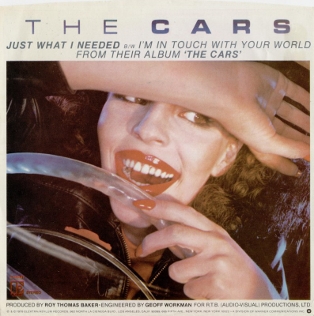
"Just What I Needed" is a song by American rock band the Cars from their self-titled debut album (1978). The song, which first achieved radio success as a demo, took inspiration from the Ohio Express and the Velvet Underground. The song is sung by bass player Benjamin Orr and was written by Ric Ocasek.
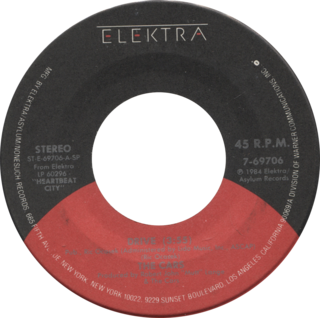
"Drive" is a song by American rock band the Cars from their fifth studio album, Heartbeat City (1984). It was released on July 23, 1984, as the album's third single. Written by Ric Ocasek, the track was sung by bassist Benjamin Orr and produced by Robert John "Mutt" Lange with the band. Upon its release, "Drive" became the Cars' highest-charting single in most territories. In the United States, it peaked at number three on the Billboard Hot 100 and topped the Adult Contemporary chart. It reached number five in the United Kingdom, number four in West Germany, number six in Canada and number three in Ireland.
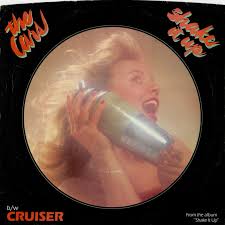
"Shake It Up" is a song by American rock band the Cars from their fourth studio album of the same name (1981). It was released on November 9, 1981, as the album's lead single. Although appearing for the first time in 1981, it was actually written years earlier by the band's songwriter and lead singer Ric Ocasek. The song became one of the Cars' most popular songs, peaking at number four on the Billboard Hot 100 and number two on the Billboard Top Tracks chart in early 1982. With the track "Cruiser" as its B-side, it reached number 14 on the Billboard Disco Top 80 chart.

"Let's Go" is a song by American rock band the Cars, written by Ric Ocasek for the band's second studio album, Candy-O (1979). A new wave rock song, the song's hook was inspired by the Routers. The song's vocals are performed by bassist Benjamin Orr.
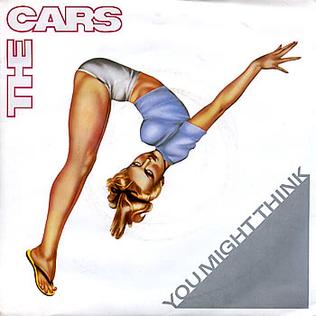
"You Might Think" is a song by American rock band the Cars from their fifth studio album, Heartbeat City (1984). The track was written by Ric Ocasek and produced by Mutt Lange and the Cars, with Ocasek also providing the lead vocals.
The discography of the American rock band the Cars includes seven studio albums, eight compilation albums, four video albums and 26 singles. Originating in Boston in 1976, the band consisted of singer/guitarist Ric Ocasek, singer/bassist Benjamin Orr, guitarist Elliot Easton, keyboardist Greg Hawkes, and drummer David Robinson. The Cars sold over 23 million albums in the United States and had 13 singles that reached the Top 40. The band was inducted into the Rock and Roll Hall of Fame in 2018.

"Good Times Roll" is a song by American rock band the Cars released as the first track from their 1978 debut album The Cars. Written by Ric Ocasek as a sarcastic comment on rock's idea of good times, the song features layered harmonies courtesy of producer Roy Thomas Baker.

"My Best Friend's Girl" is a song by American rock band the Cars from their 1978 self-titled debut album on Elektra Records, released on June 6 of that year. Written by Ocasek as a song about something that "probably ... happened to a lot of people," the track found radio success as a demo in 1977.

"It's All I Can Do" is a song by the American rock band the Cars. It is the third track from their 1979 album Candy-O. It was written by the band's leader and songwriter Ric Ocasek, and features bassist Benjamin Orr on vocals.

"Stay the Night" is the debut solo single by the Cars co-lead vocalist and bassist Benjamin Orr, released in late 1986 from his debut solo album The Lace. The song reached No. 24 on the Billboard Hot 100 chart, as well as #2 Adult Contemporary, in early 1987, becoming Orr's only top 40 hit as a solo artist.

"Emotion in Motion" is a song by Ric Ocasek, the main songwriter and lead vocalist for The Cars. It was featured on his second solo album, This Side of Paradise, and released as a single in late 1986. The tune topped the Album Rock Tracks chart and reached number 15 on the Billboard Hot 100. The song features Tears For Fears' frontman Roland Orzabal as a guest musician. It was Ocasek's only top 40 hit as a solo artist.

"Tonight She Comes" is a 1985 song by American rock band the Cars from their Greatest Hits album. It was released as a single in October 1985, reaching number seven on the Billboard Hot 100 in January 1986. The song reached number one on the Top Rock Tracks chart, where it stayed for three weeks.

"I'm Not the One" is a song by the American rock band the Cars, from their fourth album, Shake It Up. It features Ric Ocasek on lead vocals, Benjamin Orr singing the 'you know why' phrase, and the whole group repeating "going round and round" as backing vocals throughout the song.
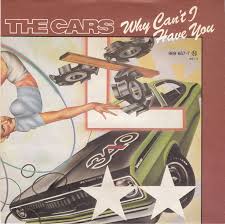
"Why Can't I Have You" is a song by American rock band the Cars from their fifth studio album, Heartbeat City (1984). It was released on January 7, 1985, as the album's fifth single. Written by Ric Ocasek, the song is a lush ballad.

"Strap Me In" is a 1987 song by the Cars, appearing on their sixth studio album Door to Door.
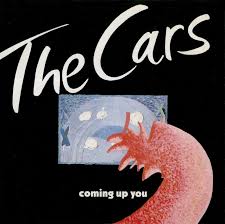
"Coming Up You" is a song by American rock band the Cars from their sixth studio album, Door to Door (1987). It was written by Ric Ocasek and sung by Benjamin Orr.



















